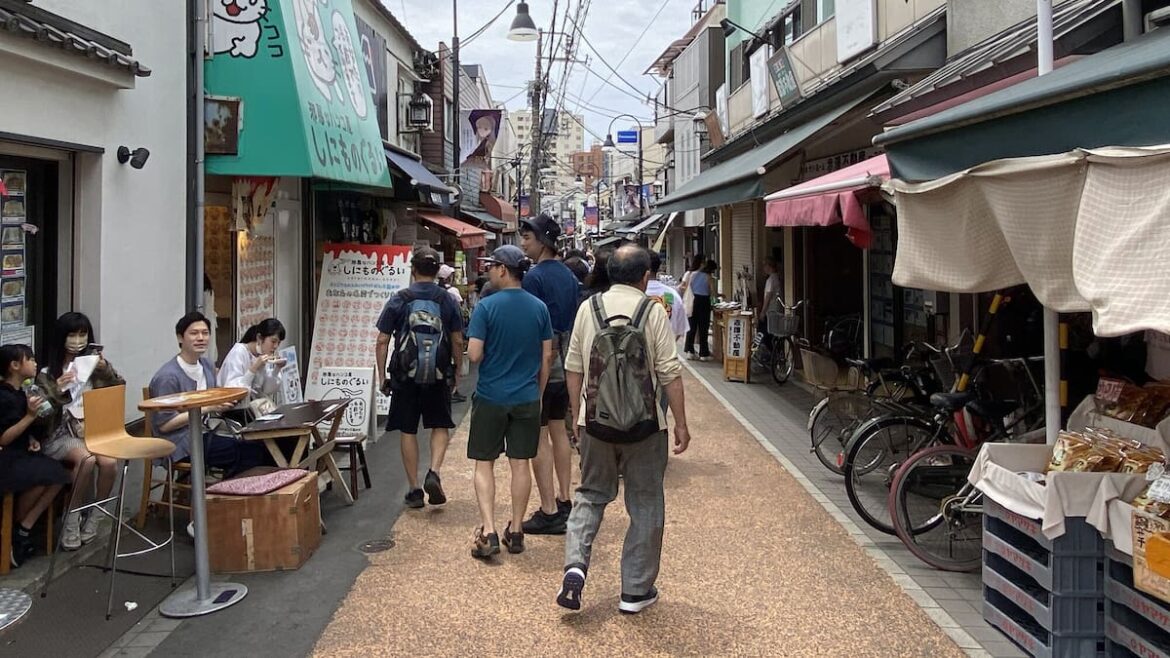“Instead, what’s considered most important is to convey feelings of gratitude with polite language. For example, before a meal, say ‘itadakimasu’. It’s an expression of gratitude towards the person who prepared the food, as well as to the producers. And afterwards, say ‘gochisousama deshita’, another expression of gratitude.”
Japan food stalls – cash only. Photo / Tamara HinsonIgnoring onsen etiquette
Going naked isn’t just optional in Japanese onsens – it’s almost always required, due to the belief that swimming gear can contaminate the water with sweat and dirt. Got tattoos? You’ll typically need to cover these – most onsen owners will have a roll of body tape for this exact purpose, because of the connections between irezumi (tattoos) and organised crime syndicates such as the yakuza. It’s equally important to shower before entering the onsen, and long hair should be tied back. “Public baths [onsens] have these rules to ensure the cleanliness of the water for others,” explains Masanori Ikegami.
Touching fresh food in supermarkets
Let’s face it. For most people, the typical grocery shop is a hands-on experience and involves grabbing and squeezing various fruits and vegetables to verify their ripeness. Which, to be very, very clear, isn’t something you should ever consider doing in Japanese supermarkets. This isn’t just down to a belief that doing so risks contaminating food items or disturbing these stores’ beautifully arranged displays of fresh produce – it stems from Japanese spirituality, too. “In Japan, it is important to treat everything with care as Japanese people believe that gods reside in all things, so rough handling risks causing these things pain,” says Michiko Sato, a national government licensed guide and interpreter and collaborative partner of Palace Hotel Tokyo.
Before you visit, learn the etiquette essentials that help you blend in effortlessly. Photo / Tamara HinsonLittering
Littering is never okay, but it’s one of the biggest social faux pas you can commit in Japan. “From their time in elementary school, Japanese children are taught to clean up after themselves and to clean their own classrooms, and they adopt this mindset from a very young age,” says Sato. “If you generate litter while out and about, put it in your pockets or a bag until you come across a rubbish bin (most convenience stores will have one) or hold onto it until you get back to your accommodation. This is precisely the reason Japanese people keep small rubbish bags to hand.”
AdvertisementAdvertise with NZME. Littering is socially unacceptable; locals often carry rubbish until bins are found. Photo / Tamara HinsonTalking too loudly on the train
Newsflash: it’s not always good to talk, especially when on Japanese trains (eating and drinking is also strongly discouraged). Take a ride on any Japanese train – whether a bullet train or metro – and you’ll be struck by the resounding silence. Keep idle chatter to a minimum and if you’re listening to music, ensure there’s no “noise leak” from the headphones. If you need to make a telephone call, step outside the carriage.
Silence is golden on Japanese trains. Phone calls and loud conversations are discouraged. Photo / Tamara HinsonUsing your chopsticks like a fork
Chopstick etiquette is taken incredibly seriously in Japan, so much so that there’s even a term to describe the ultimate no-no: neburi-bashi. This refers to the act of licking chopsticks, while “mogi-bashi” refers to the taboo of using your mouth to remove chunks of food, such as stubborn grains of rice, stuck to them. Other rules to bear in mind? Don’t pass food from one pair of chopsticks to another (this resembles the way cremated remains are transferred to an urn), don’t use them to point at someone and never use them to spear your food (this particular culinary crime is known as sashi-bashi).
Knowing Japan’s cultural norms, from onsen rules to cash payments, makes all the difference. Photo / Tamara HinsonWearing shoes indoors
First things first. Book a room at a Hilton hotel in Tokyo and you won’t be asked to remove your footwear before approaching the check-in desk. However, there are many situations where you’ll be asked to remove your shoes in Japan. These include temples, historical buildings, onsens and traditional ryokan-style hotels. Typically, these buildings will have areas known as genkans just beyond the front door. Designed as spaces where visitors can remove outdoor shoes (usually swapping them for slippers), these areas separate exterior spaces from interior ones, which will often have delicate tatami flooring.
Shoes are removed in many indoor spaces, with slippers often provided. Photo / Tamara HinsonBlowing your nose in public
Nobody will be offended if you come down with an unexpected case of the sniffles. But blowing your nose in public is a different scenario entirely and is regarded as highly impolite. “In public spaces, there’s a strong desire among Japanese people to ensure that the environment is comfortable for everyone, not just for oneself,” says Ikegami. The best approach? Stifle those sniffles with a tissue (never a handkerchief, which should only be used to wipe away sweat) and if the situation requires a full-on nose blow, find a quiet corner or public toilet to do so.
Carrying no cash
Nothing is worse than finishing a meal and having to beg the restaurant owner to wait while you make a frantic dash to the nearest cashpoint. So, while yes, the Japanese love tech, and yes, you can buy everything from fresh underpants to hot coffee from vending machines with a quick swipe of a credit card, cash is still king in many situations. “It’s always better to have some cash to hand just in case,” says Sato. “When buying tickets for travel on the local metro system, cash is necessary because not all ticket machines accept credit cards, and in many smaller restaurants, such as ramen and noodle bars, you can only pay with cash.”


AloJapan.com